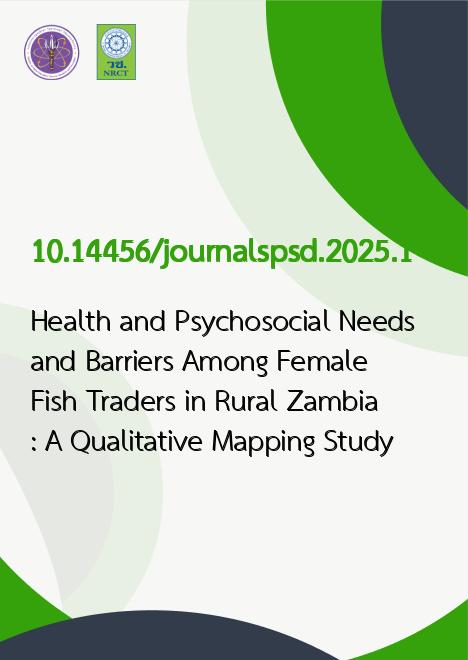
|
Health and Psychosocial Needs and Barriers Among Female Fish Traders in Rural Zambia: A Qualitative Mapping Study |
|---|---|
| รหัสดีโอไอ | |
| Creator | Lynn Michalopoulos |
| Title | Health and Psychosocial Needs and Barriers Among Female Fish Traders in Rural Zambia: A Qualitative Mapping Study |
| Contributor | Erin Walton, Nikita Aggarwal, Robert Shula, Mario Diaz, Linah Mwango, Thomas Northrup, Simona Simona |
| Publisher | Faculty of Social Administration, Thammasat University |
| Publication Year | 2568 |
| Journal Title | Journal of Social Policy, Social Change and Development |
| Journal Vol. | 3 |
| Journal No. | 1 |
| Page no. | 1-16 |
| Keyword | Female fish traders, Mental health, Psychosocial support, Health service access, Small-scale fisheries, Zambia |
| URL Website | https://so10.tci-thaijo.org/index.php/journalspsd/issue/view/224 |
| Website title | Journal of Social Policy, Social Change and Development |
| ISSN | 2985-0800 |
| Abstract | In Zambia, small-scale fisheries employ about 300,000 people in informal, unregulated sectors, which presents significant health risks, especially for female fish traders involved in “fish-for-sex” transactions, which increase vulnerability to HIV and mental health problems. This study mapped available mental health, and psychosocial support services (MHPSS) for female fish traders in the Sinazongwe District of Zambia’s Southern Province to understand the needs of fish traders, assess service provider capacities, and identify barriers to access. Between July and October 2022, semi-structured interviews were conducted with 30 participants, including fish traders, community members and leaders, and health workers. Data were analyzed using template analysis to identify themes about local health services and challenges to accessing them. Findings from this study, one of the first to focus specifically on the intersection of informal labor, gender-based health disparities, and rural mental health in Zambia — revealed significant barriers to MHPSS access, including a shortage of mental health professionals, poor infrastructure, and stigma. Many fish traders preferred to rely on traditional healers due to cultural beliefs. These findings reveal the need for developing culturally responsive approaches to improve MHPSS access in underserved fishing communities. Such an approach would involve local leaders, enhanced outreach, and training for health workers. These steps align with the United Nations Sustainable Development Goals for good health and well-being, gender equality, and reduced inequalities. |